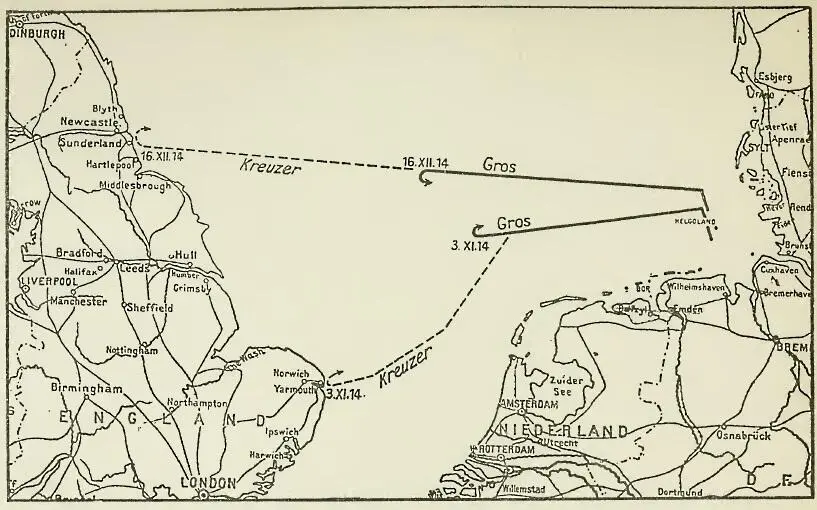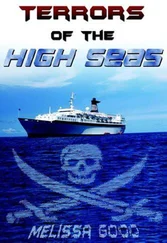The behaviour of the English was inspired at all points by consideration for what would serve their military purposes, and was not troubled by respect for international agreements. But this did not prevent England from raising loud cries later on when we also considered ourselves released from our obligation and with far more justification took action against hospital ships which, under cover of the Red Cross Flag, were patently used for the transport of troops. In the case of the Audacious we can but approve the English attitude of not revealing a weakness to the enemy, because accurate information about the other side's strength has a decisive effect on the decisions taken.
The complete loss of the 7th Half-Flotilla was very painful, and the Commander-in-Chief has been freely criticised for having sent it out insufficiently supported. The reply to that is that it is extremely difficult to decide what "sufficient support" is. Suppose, in relation to the case under consideration, we say in the light of after events that if we had had two more cruisers we should have had a superiority, such a method of reasoning involves a knowledge beforehand of the strength of the enemy ; otherwise you might have to bring up your whole fleet at every alarm if you wished to feel perfectly safe. Besides, risk is of the very essence of war. The idea is implied even in Moltke's phrase, "Think first." On the other hand, our failure revealed the importance to our" operations of the base on the Flemish coast, from which enterprises of this kind were much more feasible and indeed led to a permanent threat to the English trade route in the Channel.
In October the enemy submarines outside the Ems and in the Heligoland Bight were very active. There was hardly a day on which reports were not received that enemy submarines had been sighted. Although a good many of these turned out to be false alarms, their presence was frequently confirmed by the fact that torpedoes were fired. Apart from the loss of the Hela on September 13, which has already been mentioned, the torpedo-boat "G 116" was sunk by a torpedo north of Schiermonnikoog on October 6. It was possible to save most of the men. On the other hand, the torpedo-boat "G7" and an incoming auxiliary cruiser which were attacked in the neighbourhood of Amrum had better luck, as all the torpedoes fired at them missed.
The annoyance from submarines increased our determination to master them. In October, after the English "E 3" had fallen a victim to one of our U-boats, which had been lying in wait all day for this exceptionally well-handled ship, and several other English submarines had had unpleasant experiences with our mines in the neighbourhood of Heligoland, the area of the Bight inside Heligoland was given a wider berth. Beyond the island, however, we had perpetually to deal with the watchful activities of English submarines. Moreover, during the autumn storms the neighbourhood of the coasts was particularly unfavourable for navigation. Our own submarine cruises extended farther and farther afield as the commanders continued to gain experience, and by exchanging notes these operations became increasingly effective.
On October 15 "U16" passed Heligoland after a cruise of fifteen days, and on her return reported that she was still perfectly effective. This month also witnessed the first cruise round the British Islands. "U 20 " (Lieutenant-Commander Droescher), which had been sent out against transports in the English Channel, found itself compelled, by damage to the diving apparatus, to avoid the Channel, which was closely patrolled, and therefore returned round Ireland and Scotland. The cruise took eighteen days in all.
On November 1 the English cruiser Hermes was sunk off Dunkirk by the U-boats which were commissioned to hinder the transport of English troops to the French ports. Unfortunately no success in this particular direction was achieved.
To assign this task of interrupting the English troopship service to the Fleet was to make a totally impossible demand, as the losses it would inevitably involve would be out of all proportion to the advantage the army would derive from the disturbance to the transport of English troops such a Fleet action might cause. Even if the presence of our Fleet in these waters held up one or more ships, the way would be open the minute our Fleet left, and nothing could be easier than to arrange for ships to put out as soon as news was received that the enemy had gone. However important a factor in the war on land England's effort might be, the best way of neutralising it would have been the occupation of the French Channel coast.
If our Fleet went into the English Channel by the Dover-Calais Straits its tactical situation would be simply hopeless. It would have no room to manoeuvre against torpedo and mine attack. Our own destroyers would not have enough fuel, as their radius of action only just reached as far, and they would then find themselves compelled to return. The Fleet would then have had to do without them or return with them. There could be no question of the former alternative on account of the danger from submarines, defence against which was the work of the destroyers, and also because the destroyers were indispensable for battle. The Fleet was therefore dependent upon the radius of action of the destroyers. The appearance of the submarine as a defensive weapon has made it a necessity in modern times to screen the approach of a fleet with destroyers. Moreover, it is so important to increase the offensive powers of a fleet which is inferior in numbers by the employment of destroyers that these cannot possibly be dispensed with. If one compares, simply on a map, the position of a fleet which ventures into the Channel from the Heligoland Bight with that of a fleet making for the Heligoland Bight from the English coast - from the Firth of Forth, for example - the advantages and disadvantages of the prospects on either side are at once apparent. One fleet is placed as if it were corked in a bottle, while the other has freedom of movement over the whole area in its rear.
At the end of October Squadron II had visited Kiel dockyard to effect certain important improvements in armament and the comfort of the ships, which had suffered very much from the removal of everything which was likely to catch fire. This was in the interests of the health of the ships' companies during the winter. The compartments throughout the ship were insulated in the same way as those in the newer ships by the use of fireproof material. Living in ships in which every noise came as a shock from one end to the other became a severe trial to the nerves as time went by, and in view of the strenuous hours on watch, was prejudicial to the short period allowed for rest. The victims will never forget those weeks of the war in which the tapping of hammers and the scraping of chisels never ceased from first thing in the morning to last thing at night, and mountains of wood and superfluous paint vanished from the ship.

The Bombardment of the East Coast on November 3 and December 16, 1914
This first visit of a squadron to the Baltic was also to be employed in various exercises in which cruisers and destroyers were to participate. It appeared advisable, in view of this, to take advantage of the presence of the ships for a great enterprise against Libau which might be very unpleasant as a winter base for enemy submarines, as it was the only Russian ice-free harbour. While the orders for this enterprise were being settled with the Commander-in-Chief in the Baltic and everyone was burning for the chance of at last firing his first shot, the news reached us from the North Sea that the bombardment of English coast towns had successfully been carried out on November 3. Early that morning our battle-cruisers had appeared off Yarmouth to bombard the harbour and its fortifications while mines were being laid under their protection. The absence of Squadron II had not restrained the Commander-in-Chief from taking advantage of the favourable weather and long nights for this raid, from which we could anticipate an effect on the defensive attitude of the enemy as well as the direct influence which the damage to a hostile base would have on the enemy's operations. It was not found necessary to send the Fleet out to take up an advanced station at sea in the case of the short raid to Yarmouth, because the plan was to be based entirely on surprise under cover of darkness. After returning from this raid the old armoured cruiser Yorck ran on a mine in a mist in the Jade and was capsized by the explosion. It was found possible to save the larger part of the crew.
Читать дальше













